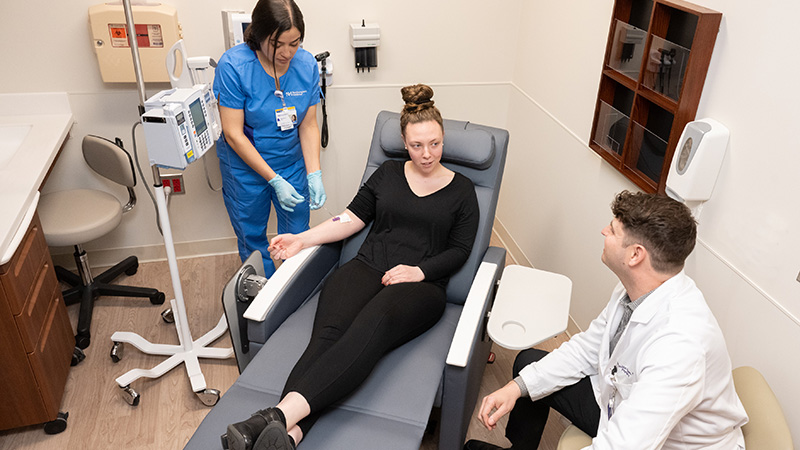Coping With ‘Scanxiety’
Tips for Managing Anxiety Before Medical Tests or Scans
Published November 2022
Have you ever felt anxious before a medical test or while waiting for the results? There is a term for this feeling — “scanxiety.”
Scanxiety was introduced to American vocabulary in 2011 in a Time article by Bruce Feiler about his experience with cancer.
Cassandra Nieves, a licensed clinical social worker, leads a scanxiety support group for patients and caregivers impacted by cancer at Northwestern Medicine Living Well Cancer Resources. Nieves says that to help patients cope with scanxiety, it is important to understand why the anxiety is there in the first place.
It is possible for scanxiety to get easier.— Cassandra Nieves
She says patients can experience anxiety before a medical test (such as a scan or MRI) for many reasons, but most often, the feelings are associated with anticipation of a diagnosis or detection of reoccurrence — things you can’t control.
“Remember that these feelings are normal and to be kind to yourself during these difficult situations,” says Nieves.
Symptoms of scanxiety can be physical, psychological or both. According to Nieves, some of the more common signs include:
- Having a hard time sleeping or breathing
- Decreased appetite
- Wandering thoughts
- Increased heart rate
- Irritability
- Nausea
Techniques and Tips for Scanxiety
To help you manage scanxiety, Nieves recommends these activities to help clear your thoughts and stay in the moment:
- Meditation
- Listening to music
- Journaling
- Drawing
- Light physical activity such as walking
- Sharing feelings with loved ones or a professional counselor
- Joining a support group to connect with others
- Breathing exercises
Nieves also recommends engaging in “grounding techniques” right before a medical test. These techniques are designed to quickly turn attention away from past and future worries and refocus on the here and now.
One of Nieves’ go-to grounding techniques is the “5-4-3-2-1.” In this five-step exercise, you notice and acknowledge five things you can see, four things you can feel, three things you can hear, two things you can smell and one thing you can taste.
Other easy ways to refocus on the present include:
- Counting backward by odd numbers, such as 3 or 7
- Spelling words or names backward
- Rubbing your palms together and thinking about the sound and warmth created
- Naming as many items as you can in a category, such as famous actors, grade school classmates, colors or dog breeds
“These simple techniques help patients avoid unhelpful thinking like trying to predict future outcomes,” she explains.
Nieves also suggests talking with your physician about what to expect before a medical test. This can help answer any questions you might have about the process. She says that learning as much as you can upfront, can help alleviate anxiety.
“While scans are often a necessary part of medical care, it is possible for scanxiety to get easier,” says Nieves. “With the proper tools and support, these feelings can become manageable over time.”




